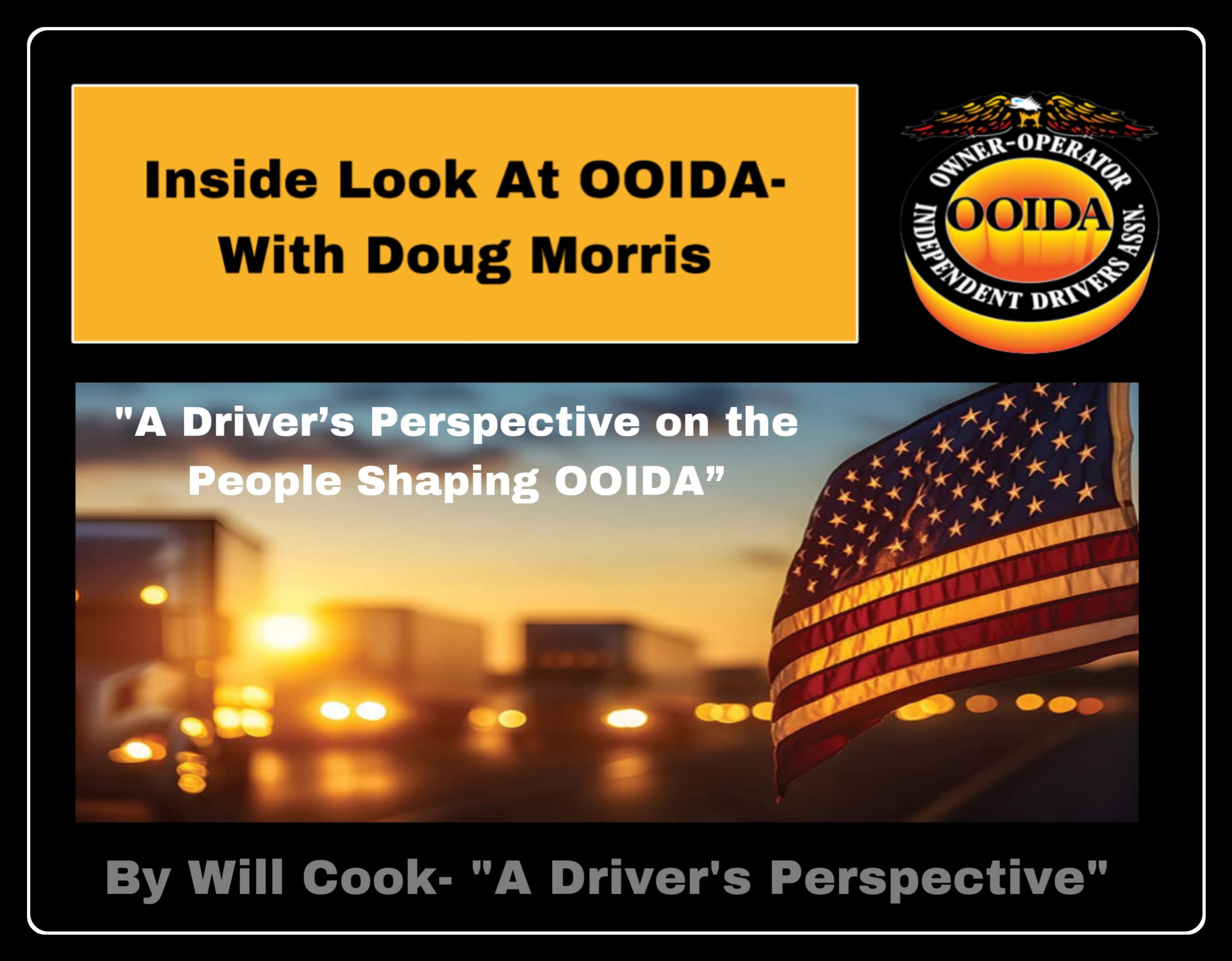
A Conversation with Doug Morris, Director of Safety, Security & State Affairs
I got the opportunity to sit down with one of the many men and women who keep OOIDA going – just one of many important people who make this association what it is. That’s the point of this new series: to give an inside look at the folks fighting for drivers and owner-operators inside OOIDA – what they do, how they do it, and why it matters.
For this first interview, I sat down with Doug Morris, OOIDA’s Director of Safety, Security & State Affairs. Before he became a voice for truckers in Washington, D.C., Morris spent more than 25 years with the Maryland State Police, leading transportation security after 9/11, working with federal and state agencies, and training in specialized commercial-vehicle inspections – including radiological, at a time when only a handful in the country had that expertise. Since joining OOIDA in 2009, he’s become one of the industry’s most persistent watchdogs on safety regs, enforcement policy, and driver rights.
From Lawman to Driver Advocate
Morris didn’t set out to work for OOIDA. A trip to Kansas City to meet the team – and a dinner with the late Jim Johnston – changed his mind.
“When you see someone’s passion for trucking and for drivers, you want to be part of that,” Morris told me.
He took early retirement, joined OOIDA, and his role quickly expanded: national security initiatives, regulatory analysis, then lobbying, plus a heavy load of state-level legislative work during the first half of each year.
Who Writes the Rules (and Who Enforces Them)
One point Morris wants drivers to understand: Congress writes the laws; FMCSA implements what Congress funds; CVSA (a coalition of state enforcement) standardizes the inspection process and out-of-service criteria that states adopt and enforce.
“If you’re mad at FMCSA for something Congress mandated – or for how states are enforcing -it’s easy to yell at the wrong building,” he said. “Know which committee holds the pen.”
The Non-Domiciled CDL Mess
On the hottest issue right now – non-domiciled CDLs and visa drivers – Morris is blunt. The original intent of non-domiciled CDLs was simple: when a U.S. trainee tested in a different state than their residence, they’d transfer the temporary credential back home for a standard CDL. It wasn’t meant as a backdoor for foreign drivers.
OOIDA, he says, had raised alarms for years, but national traction followed public attention and grassroots pressure after a series of fatal crashes and fraud cases made headlines.
- OOIDA pressed FMCSA to restore English-language proficiency with real teeth in out-of-service criteria.
- They engaged DHS and the DOT Secretary to tighten guidance and close loopholes.
- They continue pushing states that still don’t track or properly gate non-domiciled issuances.
“It’s complicated for agencies that don’t live in this space,” Morris said. “You literally have to walk them through how CDL issuance works and where the guidance went sideways.”
Speed Limiters, ELDs, and Regulation by Megacarrier
Morris argues that some high-dollar lobbying campaigns push rules that benefit large fleets more than safety.
- Speed limiters: “Great for fuel budgets, not a magic wand for crashes,” he said, noting increased rear-end collisions.
- ELDs: Sold as a silver bullet, but in practice they’ve increased stress and congestion and boxed experienced drivers into unsafe timing.
“Talk to working drivers before you regulate drivers,” he said. OOIDA’s 21-member board—all truckers with hundreds of cumulative years behind the wheel—is built for that.
Money, Access, and the Grind
OOIDA’s lobbying dollars are modest compared to the millions spent by major trade groups and allied interests.
“Every dollar has to work,” Morris said.
The counterweight is grassroots: members calling and visiting lawmakers, especially those sitting on Transportation & Infrastructure (House) and Commerce, Science & Transportation (Senate).
“Lawmakers listen to constituents – and to money,” Morris said. “We need members engaged so our side of the story is in the room.”
Parking, Pay, and Predatory Leases
Beyond the headline fights, Morris points to other critical issues:
- Guaranteed overtime for drivers – to push rates up and pay drivers for their time.
- Free truck parking – while some paid-parking interests fight to preserve scarcity.
- Predatory lease-purchase contracts – OOIDA’s Business Services reviews agreements and warns drivers when the math sinks them from day one.
On AB5/independent contractor rules, Morris deferred details to OOIDA’s legal team, but confirmed the fight is active and crucial to the owner-operator model.
Automation: The Existential Question
Morris’s starkest warning is about driverless trucks. If Congress authorizes interstate operation without a driver in the cab, he believes small-business trucking will be gutted. Billions in hedge funds and tech money are pushing hard; some states already allow AV pilots; federal preemption could accelerate it.
“There will be niches,” he said, “but for dry van, reefer, and flatbed – if we don’t act now – the handwriting is on the wall.”
What Drivers Can Do Right Now
Morris’s call to action is simple:
- Visit fightingfortruckers.com.
- Identify your House and Senate members.
- Meet staffers who cover transportation.
- Speak to specific bills – support or oppose – and explain the impact on your business.
- Build a relationship and follow up.
“Don’t waste your time shouting at the wind,” he said. “Show up where decisions are made.”
Why This Series Matters
OOIDA is not just a logo – it’s hundreds of people grinding in meetings, drafting testimony, managing state fights, and walking the halls of Congress so drivers still have a future in this industry. Doug Morris is one of them.
In the coming pieces, we’ll keep pulling the curtain back on the men and women inside OOIDA who spend their days fighting for drivers and owner-operators.
If you’re a driver or owner-operator, your voice matters. Get informed, plug in, and stand with the folks who show up for you every day.
Will Cook | A Driver’s Perspective

